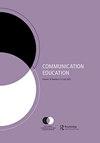Paradoxical career sensemaking among emerging adults
IF 0.8
Q3 COMMUNICATION
引用次数: 0
Abstract
ABSTRACTEmerging adults, who are late millennials and Gen Z members, question the worth of higher education, especially in preparation for volatile labor markets, careers, and other precarities. We analyzed emerging adults’ sensemaking about this education–career–precarity mix through the constitutive lens of paradox using the applied tensional approach. We identified two main paradoxes centering around feelings of education and career security and vulnerability: (a) students’ beliefs about educational attainment as leading directly to career success (golden ticket) that coexist with understandings that there are no guarantees; and (b) feelings of isolation in the self-managed career (“it’s all up to me”) that share space with desires for social networks but as educational products established by others and consistent with student-as-consumer and neoliberal ideologies. In demystifying these paradoxes, we advocate more-than approaches that position tensions as opportunities, incorporate both career development and critical communication pedagogy, and transcend through quality control interventions.KEYWORDS: careerssensemakingparadoxescommunication educationapplied tensional approach Disclosure statementNo potential conflict of interest was reported by the author(s).初出期成年人自相矛盾的职业意义
千禧一代晚期和Z世代的“新成人”质疑高等教育的价值,尤其是在为动荡的劳动力市场、职业和其他不稳定因素做准备方面。我们使用应用张力的方法,透过悖论的构相视角,分析初出期成人对教育-职业-不稳定性组合的理解。我们确定了围绕教育与职业安全和脆弱性的感觉的两个主要悖论:(a)学生认为教育成就直接导致职业成功(金券),与没有保证的理解并存;(b)在自我管理的职业生涯中感到孤立(“一切由我决定”),这与对社交网络的渴望共享空间,但作为他人建立的教育产品,与学生作为消费者和新自由主义意识形态相一致。在消除这些矛盾的过程中,我们提倡的方法不仅仅是将紧张视为机会,结合职业发展和批判性沟通教学法,并通过质量控制干预来超越。关键词:职业、情感、制造悖论、沟通教育、应用张力法披露声明作者未报告潜在的利益冲突。
本文章由计算机程序翻译,如有差异,请以英文原文为准。
求助全文
约1分钟内获得全文
求助全文
来源期刊

COMMUNICATION EDUCATION
EDUCATION & EDUCATIONAL RESEARCH-
CiteScore
3.10
自引率
34.80%
发文量
47
期刊介绍:
Communication Education is a peer-reviewed publication of the National Communication Association. Communication Education publishes original scholarship that advances understanding of the role of communication in the teaching and learning process in diverse spaces, structures, and interactions, within and outside of academia. Communication Education welcomes scholarship from diverse perspectives and methodologies, including quantitative, qualitative, and critical/textual approaches. All submissions must be methodologically rigorous and theoretically grounded and geared toward advancing knowledge production in communication, teaching, and learning. Scholarship in Communication Education addresses the intersections of communication, teaching, and learning related to topics and contexts that include but are not limited to: • student/teacher relationships • student/teacher characteristics • student/teacher identity construction • student learning outcomes • student engagement • diversity, inclusion, and difference • social justice • instructional technology/social media • the basic communication course • service learning • communication across the curriculum • communication instruction in business and the professions • communication instruction in civic arenas In addition to articles, the journal will publish occasional scholarly exchanges on topics related to communication, teaching, and learning, such as: • Analytic review articles: agenda-setting pieces including examinations of key questions about the field • Forum essays: themed pieces for dialogue or debate on current communication, teaching, and learning issues
 求助内容:
求助内容: 应助结果提醒方式:
应助结果提醒方式:


